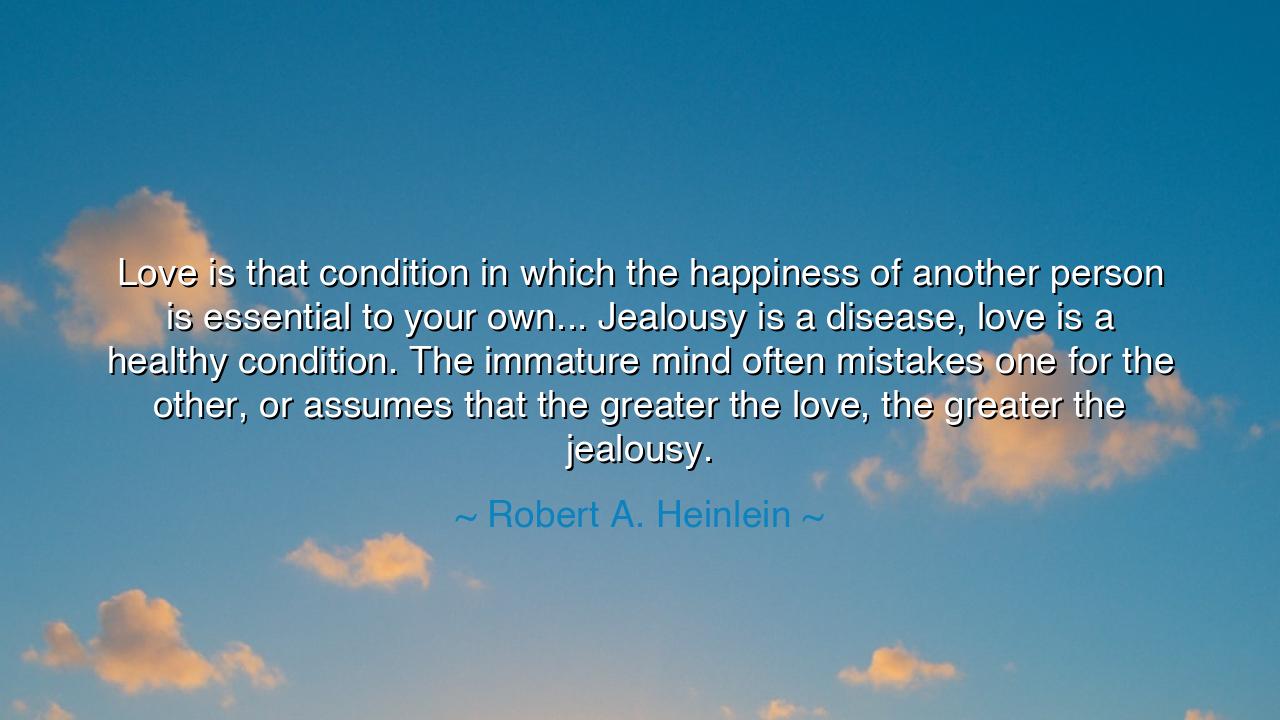
Love is that condition in which the happiness of another person
Love is that condition in which the happiness of another person is essential to your own... Jealousy is a disease, love is a healthy condition. The immature mind often mistakes one for the other, or assumes that the greater the love, the greater the jealousy.






"Love is that condition in which the happiness of another person is essential to your own... Jealousy is a disease, love is a healthy condition. The immature mind often mistakes one for the other, or assumes that the greater the love, the greater the jealousy." — Robert A. Heinlein
In these piercing words, Robert A. Heinlein, a master of both science and soul, lifts the veil from one of humanity’s oldest confusions — the tangled bond between love and jealousy. He speaks not as a poet of fleeting sentiment, but as a sage of reasoned passion. To love, he teaches, is not to possess, but to care so deeply for another that their happiness becomes the breath of your own being. It is a merging not of ownership, but of empathy — a condition where the soul finds its joy not in control, but in the flourishing of the beloved. Yet, when love is corrupted by fear, by pride, by insecurity, it becomes jealousy — a shadow that poisons what it claims to protect.
Heinlein’s words come from a modern age, yet they carry the eternal rhythm of ancient wisdom. The Greeks spoke of Eros and Agape — desire and divine love. Eros reaches, grasps, and consumes; Agape gives, releases, and uplifts. Heinlein reminds us that jealousy belongs to the first — it is hunger disguised as devotion. Love, the true kind, belongs to the second — it is freedom wrapped in tenderness. To the immature, these appear the same, for both burn with intensity; yet one burns to illuminate, and the other to destroy.
The immature mind, he says, mistakes possession for affection. It believes that to love deeply is to guard fiercely, to mark territory, to fear loss at every turn. But the wise heart knows that love cannot live behind walls. It thrives in trust, and dies in suspicion. For jealousy is the child of insecurity, whispering, “If they find joy elsewhere, I shall fade.” Love, by contrast, proclaims, “Let them shine, for their light is also my light.” Thus, love is a healthy condition, because it heals and enlarges the soul; jealousy, a disease, because it shrinks and consumes it.
History itself bears witness to this truth. Think of Othello, the noble Moor of Venice, whose heart overflowed with love for Desdemona — yet his mind was poisoned by jealousy. Under Iago’s cunning, his affection turned to torment, his admiration to rage. He mistook doubt for passion, suspicion for loyalty. In the blindness of jealousy, he destroyed the very life he adored. Othello’s tragedy was not that he loved too little, but that he mistook possession for love, believing that love must bind, not liberate. His downfall stands as a timeless warning: jealousy masquerades as devotion, but its fruit is always sorrow.
Yet there is another side to this truth — one radiant and enduring. Consider Marcus Aurelius, the philosopher-emperor, who once wrote of his wife, “Whatever pleases her, pleases me.” Here speaks not the possessive husband, but the awakened soul. He found joy not in control, but in harmony; not in dominion, but in shared serenity. Such is the mark of true love — when your heart’s peace depends not on mastery, but on mutual happiness. When the beloved’s smile becomes your sunrise, yet their freedom remains your vow.
Heinlein, though a man of the modern world, stands in the lineage of these timeless voices. His philosophy of love calls us to maturity — to outgrow the childish belief that closeness requires ownership, that trust requires vigilance, that affection must be guarded by fear. For love, when pure, is a dance between two free spirits, not a chain binding two captives. To love rightly is to celebrate another’s joy as your own, to find expansion rather than diminishment in their freedom.
So, my listener of the living age, learn this truth as you would a sacred law: to love is to will the good of another, even when it asks for your humility. When jealousy whispers to you, answer with faith. When fear tempts you to possess, remember that love’s highest form is freedom. Nurture your heart as a garden — root it in trust, water it with kindness, and prune away the weeds of suspicion. Then, like a tree nourished by sunlight, your love will bear fruit that feeds both souls.
For in the end, as Heinlein reminds us, love is health — a condition of the soul in harmony with itself and the world. But jealousy is sickness — the fever of fear, the trembling of insecurity. Choose love, and your spirit will expand to embrace the infinite. Choose jealousy, and your spirit will wither in its own shadow. Therefore, let your love be not a cage, but a sky; not a chain, but a wind — and in that freedom, you shall find not only happiness, but wholeness.






AAdministratorAdministrator
Welcome, honored guests. Please leave a comment, we will respond soon